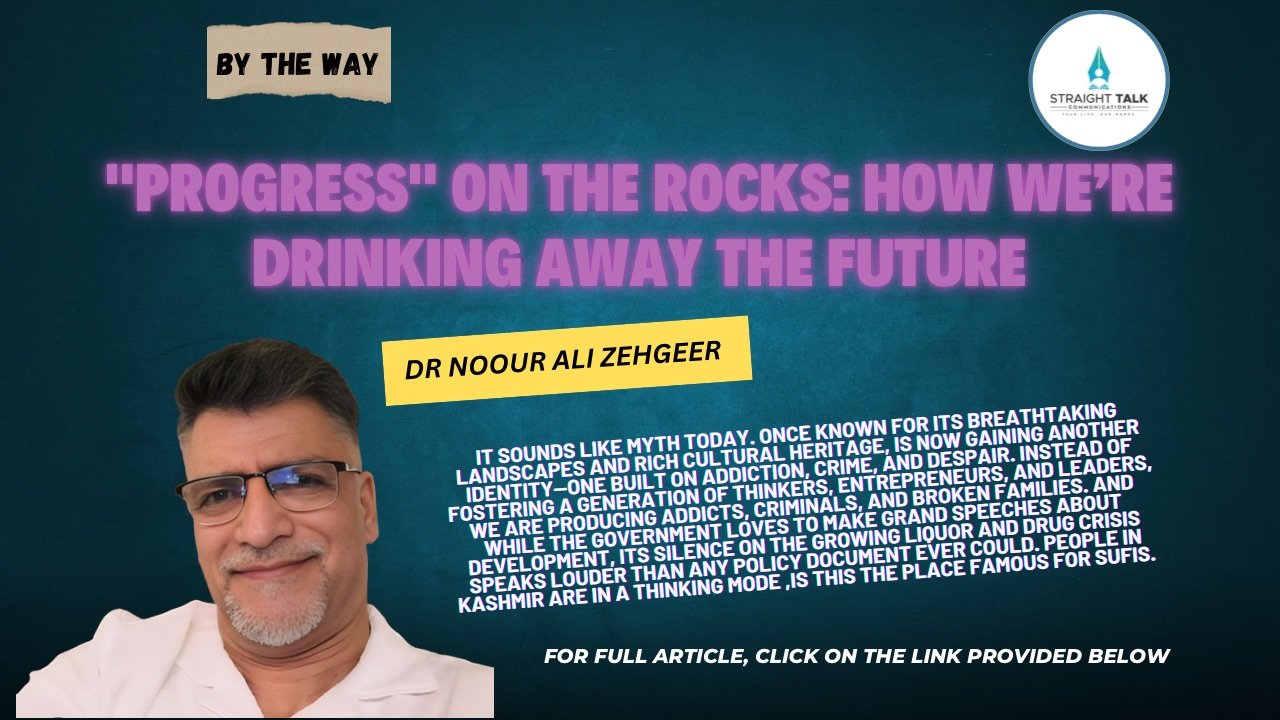“Progress” on the Rocks: How We’re Drinking Away the Future

Dr Noour Ali Zehgeer
It Sounds Like Myth today. Once known for its breathtaking landscapes and rich cultural heritage, is now gaining another identity—one built on addiction, crime, and despair. Instead of fostering a generation of thinkers, entrepreneurs, and leaders, we are producing addicts, criminals, and broken families. And while the government loves to make grand speeches about development, its silence on the growing liquor and drug crisis speaks louder than any policy document ever could. People in Kashmir are in a thinking mode ,is this the place famous for Sufis.
The Gift That Keeps on Destroying
Let’s not pretend—alcohol and drugs contribute absolutely nothing to society. They ruin families, fuel crime, and turn promising young lives into cautionary tales. Yet, liquor shops continue to multiply, and drug peddlers operate with disturbing ease, all under the government’s watchful (or should we say, conveniently blind) eyes. If something is systematically destroying an entire generation, shouldn’t it be eliminated? Or are we now measuring progress by the number of intoxicated youths stumbling through the streets?
Of course, some argue, “Banning alcohol and drugs won’t stop people from finding them.” Ah yes, the classic defeatist excuse. By this logic, why bother with laws at all? People still steal, so should we legalize theft? Murders happen despite strict laws—should we decriminalize homicide? If a government cannot enforce a ban, the problem is not the ban—it’s the government’s incompetence or, worse, its lack of will.
A Crisis in Plain Sight
The damage isn’t hidden; it’s written across every street corner. Addiction is rising. Crime is skyrocketing. Hospitals are overflowing with broken bodies and minds. Families are collapsing under the weight of substance abuse. But as long as liquor taxes keep filling government coffers, who cares, right?
Speaking of money, let’s not ignore the government’s favourite excuse: “Liquor sales generate revenue.” What an inspiring business model! Make money by poisoning your own people. If this is how governance works, why stop at alcohol? Let’s legalize gambling, smuggling, and every other vice under the sun. After all, who needs a healthy, productive society when there’s cash to be made?
A nation’s greatest wealth is its youth. If Jammu and Kashmir continues down this path, it is effectively bankrupting itself—not financially, but morally and socially.
Addiction Breeds Crime and Poverty
Alcohol and drugs don’t just destroy health; they create a chain reaction of devastation. Students drop out of school. Workers lose their jobs. Families fall apart. And addiction turns people into thieves, abusers, and even murderers. Yet, we continue treating this as a manageable issue rather than the full-blown crisis it has become, and let’s not forget—drug money and terrorism go hand in hand. Addiction makes young people vulnerable to recruitment by criminal networks. The very same government that claims to be fighting terrorism is allowing one of its biggest financial backbones to thrive. Maybe banning liquor and drugs isn’t just a public health issue—it’s a national security necessity.
Jammu & Kashmir Deserves Better
Jammu and Kashmir has a proud history, strong traditions, and a resilient people. It does not need the filth of addiction destroying its social fabric. Other states like Gujarat and Bihar have banned alcohol and seen improvements—lower crime rates, better health, and stronger families. If they can do it, why can’t J&K? Perhaps because certain people profit more from destruction than from discipline. Some claim that prohibition doesn’t work, pointing to illegal trade and smuggling. But this argument only exposes another failure—poor law enforcement. When something is killing your people, you don’t make excuses—you fight to stop it. Anything less is betrayal.
The Government’s Silence is Deafening
The youth of Jammu and Kashmir deserve better. They deserve education, employment, and a future that isn’t clouded by addiction. But none of this is possible while drugs and alcohol continue to flow freely. If the government fails to act, history will not remember it as a saviour, but as an accomplice to an entire generation’s downfall. And no, we don’t need to drown this argument in statistics. The proof is in front of us. Walk through any neighbourhood, read the headlines, or talk to families who have lost their loved ones to addiction. Broken homes, overdoses, rising crime, and streets flooded with drug-related violence—this isn’t speculation. This is reality.
We’ve reached a point where a single day without a drug-related crime feels like an anomaly. Schools and colleges, meant to be safe spaces for learning, have become hunting grounds for drug peddlers. Police reports keep piling up, yet the problem only worsens. If all of this still isn’t proof that urgent action is needed, then what is?
Inaction is the Real Crime
This crisis continues not because of ignorance, but because of deliberate inaction. Authorities know what’s happening. Leaders see the headlines. Law enforcement knows where the supply is coming from. And yet, the poison flows. Why?
Let’s not forget only wealth for any society is out future generation who are going to be custodians of our heritage and cultural value. How many more lives must be destroyed before those in power decide to act? How many more families must be torn apart before the government realizes that revenue from liquor is not worth the cost? The real question isn’t whether a ban will work. The real question is: Does the government even want to stop this? Or is the destruction of youth just another acceptable cost of “progress”?
(The views expressed in the article are of the author. Straight Talk Communications doesn’t take responsibility of the comments made in the article.)







